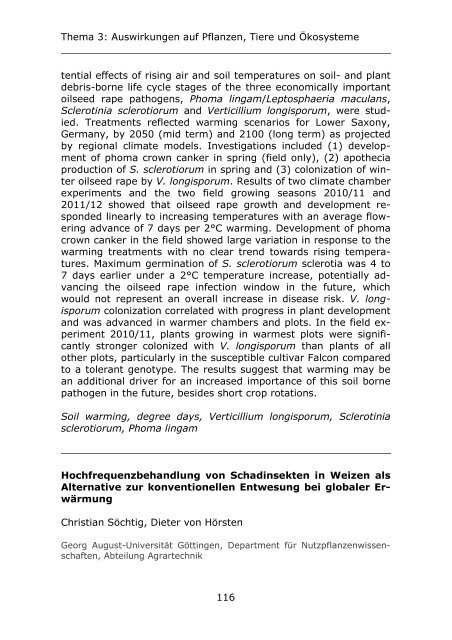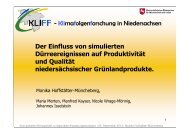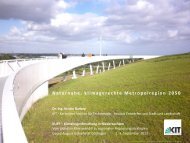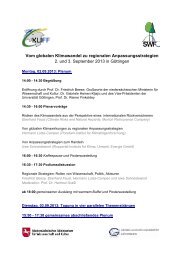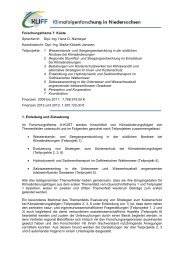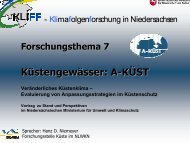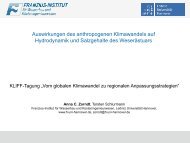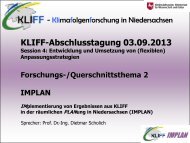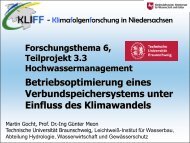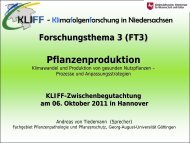Abstract-Band KLIFF-Tagung 2.und 3.9.13
Abstract-Band KLIFF-Tagung 2.und 3.9.13
Abstract-Band KLIFF-Tagung 2.und 3.9.13
Sie wollen auch ein ePaper? Erhöhen Sie die Reichweite Ihrer Titel.
YUMPU macht aus Druck-PDFs automatisch weboptimierte ePaper, die Google liebt.
Thema 3: Auswirkungen auf Pflanzen, Tiere und Ökosystemetential effects of rising air and soil temperatures on soil- and plantdebris-borne life cycle stages of the three economically importantoilseed rape pathogens, Phoma lingam/Leptosphaeria maculans,Sclerotinia sclerotiorum and Verticillium longisporum, were studied.Treatments reflected warming scenarios for Lower Saxony,Germany, by 2050 (mid term) and 2100 (long term) as projectedby regional climate models. Investigations included (1) developmentof phoma crown canker in spring (field only), (2) apotheciaproduction of S. sclerotiorum in spring and (3) colonization of winteroilseed rape by V. longisporum. Results of two climate chamberexperiments and the two field growing seasons 2010/11 and2011/12 showed that oilseed rape growth and development respondedlinearly to increasing temperatures with an average floweringadvance of 7 days per 2°C warming. Development of phomacrown canker in the field showed large variation in response to thewarming treatments with no clear trend towards rising temperatures.Maximum germination of S. sclerotiorum sclerotia was 4 to7 days earlier under a 2°C temperature increase, potentially advancingthe oilseed rape infection window in the future, whichwould not represent an overall increase in disease risk. V. longisporumcolonization correlated with progress in plant developmentand was advanced in warmer chambers and plots. In the field experiment2010/11, plants growing in warmest plots were significantlystronger colonized with V. longisporum than plants of allother plots, particularly in the susceptible cultivar Falcon comparedto a tolerant genotype. The results suggest that warming may bean additional driver for an increased importance of this soil bornepathogen in the future, besides short crop rotations.Soil warming, degree days, Verticillium longisporum, Sclerotiniasclerotiorum, Phoma lingamHochfrequenzbehandlung von Schadinsekten in Weizen alsAlternative zur konventionellen Entwesung bei globaler ErwärmungChristian Söchtig, Dieter von HörstenGeorg August-Universität Göttingen, Department für Nutzpflanzenwissenschaften,Abteilung Agrartechnik116


